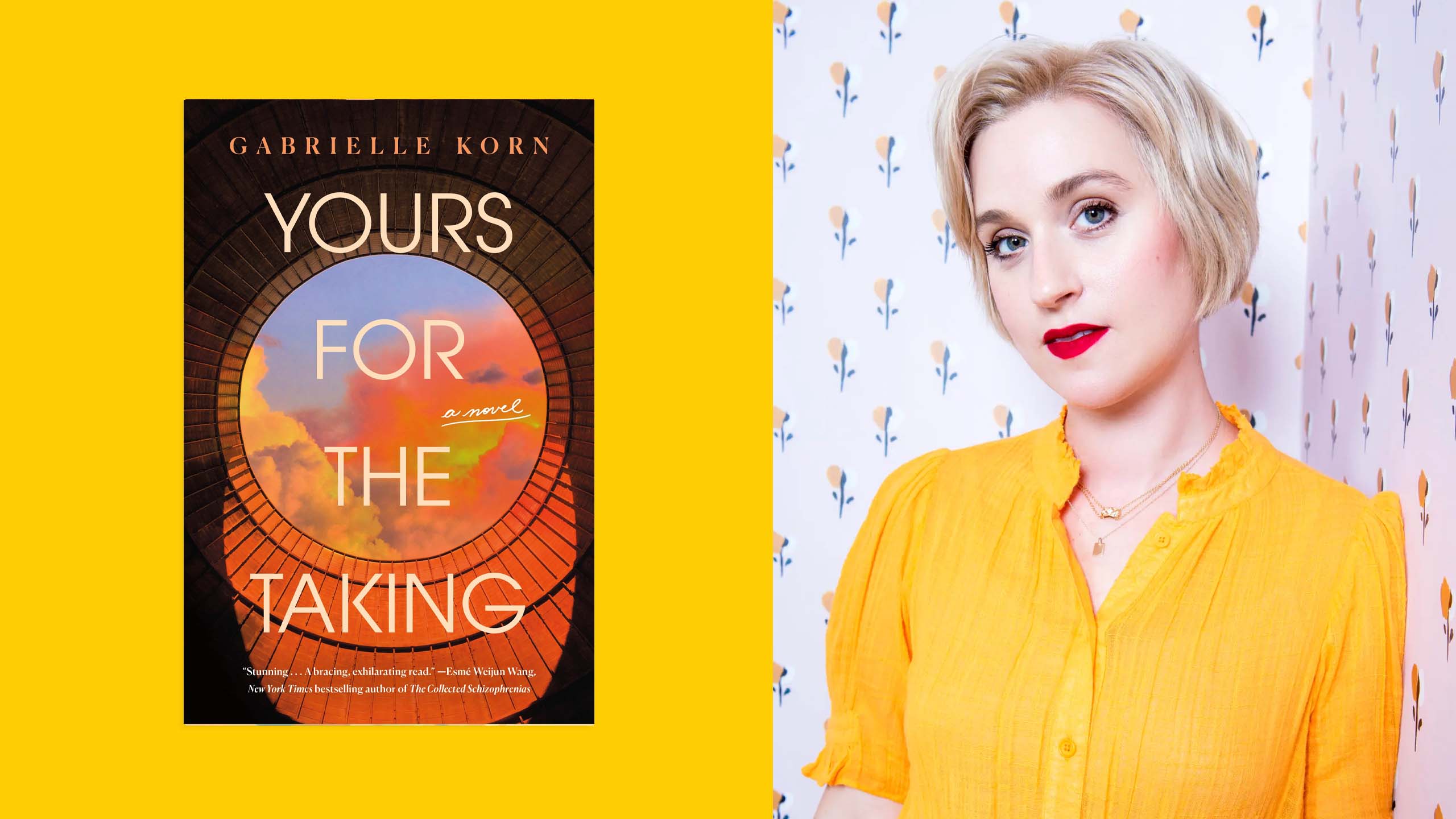Yours for the Taking, Gabrielle Korn’s recent queer dystopian novel, begins playfully: one of its two epigraphs, attributed to “Jacqueline Millender,” is an excerpt from a book called Yours for the Taking!: Reclaiming Female Power in a Changing World, published in 2045. The quote calls for increased focus on women’s “power” rather than women’s “empowerment,” and claims that women need to “stop hesitating, and start claiming” if “equal rights” are to be achieved before climate change wipes out humanity. This is a titillating choice of opener: are we meant to find alignment with this paragraph, which exhibits the language of corporate feminism and possible TERFiness? Are we being teased by an edgy text from the future?
We soon find out that the quoted author is the villain of the story: a white billionaire “women’s rights” advocate and heiress-entrepreneur who sets up a large-scale social experiment in a megabunker, built over and around what was formerly Manhattan. The bunker and others like it all over the climate-crisis-ravaged Earth form an exclusive project for human survival called Inside. From the get-go, the project is dubious: it is funded by the ultra-wealthy, and requires the world’s increasingly climate-stressed inhabitants to provide invasively personal information in order to apply for entry. Most applicants are rejected, due to not meeting the project’s unstated requirements, and left to fend for themselves amidst environmental disasters and resource scarcity. Those who are accepted to the Inside must agree to enter the bunkers immediately, and possibly forever. Meanwhile, the super-wealthy are, à la Elon Musk, living comfortably in space.
It turns out that Jacqueline Millender’s Inside project has a special twist, which the rest of the world’s Insides do not: she only allows women to enter it. She is vague about whom she considers to be women: when questioned, she insists that this is a trans-inclusive term. However, she also allows non-binary people to enter, while continuing to refer to everyone as “women,” which worries some characters. Perhaps FLINTA is the term she was looking for? She also muses about the possibility of creating a “post-race” world Inside.
Yours for the Taking is populated by queer and trans characters, who set aside their uncertainties about the influential girl boss in order to guarantee their own safety from the escalating climate crisis. Ava is a young, queer white woman, academically smart but naive, raised by wealthy but disinterested parents, whose application to Inside is successful because, though she doesn’t know it, her personal and physical characteristics are desirable to Millender. Shelby is a young white trans woman who becomes fascinated by Millender’s girl power ethos, despite her leftist parents’ warnings about the pitfalls of corporate feminism. Olympia is a talented Black doctor who lets herself be recruited by Millender to run the entire health operation Inside, ignoring the ethical alarm bells clanging in her brain.
“The problem, again and again, has been men,” Millender declares. When pushed, she agrees that this means cis men; but she doesn’t allow trans men into Inside, either. She wants to “eliminate patriarchy—and its reverberations—in a single generation.” Her logic is that the first generation of children born Inside, without outside interference, will somehow neglect to inherit the patriarchal structures that their parents have absorbed, and that this will result in a new matriarchal society. However, Millender increasingly favours the Inside inhabitants who can give birth, while trans women and other people who can’t become pregnant are considered second-class citizens. Her nonsensical approach is just unhinged enough to sound realistic, coming from a billionaire. It’s a strange, dramatic set-up that quickly starts to fall apart. The book’s initial playfulness, and the promise of its motley crew of characters with vastly different life experiences and outlooks, soon becomes a somewhat anodyne exercise in appearing to ask big questions about gender and power, without significant disruption to the status quo, or much compelling tension or strife.
Yours For the Taking is Korn’s debut novel. She is a writer and editor living in Los Angeles, who recently ran LGBTQ+ strategy at Netflix. While the novel echoes a host of boundary-pushing queer and feminist speculative fiction, from Ursula K. Le Guin’s literary experiments with unfamiliar gender and sexual relations on invented planets, to the various reproductive dystopias of Octavia Butler, Margaret Atwood and Louise Erdrich, to Gretchen Felker-Martin’s trans horror hit Manhunt, which imagines a terrifying future plague that transforms anyone with a certain level of testosterone into a rabid beast, there is a certain Netflixian vibe to Yours for the Taking. Despite the intriguing set-up and the diverse cast of characters, the novel is written in dry, serviceable prose, and doesn’t flesh out its characters adequately enough to differentiate them substantially from each other. Much of the intrigue, particularly Jacqueline’s nefarious eugenics plan, is explained to the reader at the outset, which means that there is little to reveal throughout the text, and therefore few opportunities for shock or surprise. Even when the secrets of Inside are exposed to some of the characters, many of whom are deeply impacted by them, the news is quickly absorbed, with little dissonance or conflict.
Warning: plot spoilers ahead.
Characters’ actions often seem to be in service to the plot, rather than aligned with their personalities or the positions they occupy in the world. Shelby decides, with minimal difficulty, to leave her loving family to fend for themselves on the increasingly unlivable earth. We’re told that she makes this decision because Millender will provide her with continuing hormone therapy, but as the book tells us little about the realities of trans people in this future, we don’t have an adequate understanding of her seemingly selfish decision. Olympia, the one Black character, is suspicious of the ethics of Millender’s project, recalling the eugenic experiments that Black people in the United States have been subjected to. However, after some personal setbacks, she becomes the head doctor of Millender’s Inside, which requires her to inseminate people without their consent, while drugging them with Xanax to calm them enough to carry their babies to term. The mental leap that Olympia makes in order to justify this new job is so large and so fast that it’s hard to believe, which makes Olympia feel like a partly formed character. Even our villain, Jacqueline Millender, lacks dimension and punch. Though her project is manipulative and evil, she herself is not written with much captivating detail. Her personality is disappointingly bland, lacking the idiosyncrasies and contradictions that can make for an intriguing antagonist. Her orders are always carried out with so little pushback that she lacks opportunities to wield her power in impressive or surprising ways.
Perhaps in an attempt to massage the unbelievability of certain characters’ actions, Korn is prone to spelling out their thoughts and motivation. Olympia’s inner turmoil upon beginning her new job is laid out as follows: “Out of all of them [her family], she knew she had the best chance for survival. But, she thought, looking around Jacqueline’s office with a sinking feeling in her stomach, at what cost?” Ava, upon entering Inside, reflects “that this moment marked the clear divide between a before and an after, though what the after would look like was still a question mark.” Ava’s thoughts are not revelations to the reader: yes, entering a locked-down bunker forever during a time of devastating climate crisis marks a clear divide between before and after. Yes, the future is highly uncertain. Later on, when Ava is depressed and pregnant against her will, she has another revelation: “Everyone pretends we’re in heaven here, that it’s so great without men, blah blah blah. But is it? Do we really have more control of our bodies in Jacqueline Millender’s little world?” The reader is already well aware that Millender’s experiment is oppressive and harmful, and that the woman is a hypocrite who wants to “eliminate patriarchy” solely so that she can have control of everything; thus, Ava’s realization doesn’t have much impact.
Yours for the Taking would be vastly more compelling if its characters had thoughts, worries and epiphanies that were unexpected, thereby eliciting uncomfortable reflections for the reader, or asking us to think about feminism or climate change or hoarding capital from new angles. There are more opportunities for Korn to meaningfully skewer the status quo, once the first generation of children born Inside—presumably without the social assumptions that are familiar to us—are old enough to question their surroundings. But these younger characters don’t do much other than to chafe against the easy yet restrictive world of the bunker, and then to vaguely plot an escape, without challenging their parents’ generation in any startling ways. Their small rebellions read like the rebellions of many teenagers—necessary, but not ultimately damaging the pervading world view. As a result, the novel can only confirm the obvious: gender-essentialist feminism is bad; billionaire hoarders with delusions of grandeur should not be allowed to direct eugenic experiments according to their whims.
More disturbingly, Yours for the Taking assumes that bad rich people can be easily held to account by global institutions. Millender’s eventual takedown is orchestrated not through meaningful social revolution or upheaval of the oppressive global hegemony, but instead through the snap decisions of a handful of individuals, based largely on their personal situations—all according to liberal notions of law and order. Whereas Korn could have imagined what a resistance movement looks like in the world of her novel, the book’s denouement reveals a perplexing confidence in global institutions and incarceration. Millender is reported to the “United World Government,” removed from her position of power and put in prison. The small group’s sudden decisions are immediately supported by the entire workforce on Millender’s space shuttle, as if these workers, who have long been under the thumb of billionaire tyrants, were simply waiting for someone else to step in and tell them what to do. The book’s reliance on a global government to adequately respond to human rights abuses by the rich and powerful betrays an outlook that seems particularly out of touch in today’s political context.
Somewhere in here is a more affecting story of a young queer white woman, raised in privilege, who has to figure out her morals and boundaries in an increasingly dangerous world that people like her have brought into existence. Ava is the character who arguably has the most appealing personal arc: she goes from believing wholeheartedly in Millender’s vision, to becoming a victim of its forced birthing program, to realizing the rotten principles of the project she signed on to. She becomes a parent against her will, and also moves quite beautifully into a parent role, forming a deep bond with both of her children. Sadly, her story gets lost amidst all the plot points and characters. Another character whose trajectory is intriguing but minimally covered is Orchid, Ava’s former lover, a working-class lesbian who gets rejected from Inside, and makes her solitary way north, ending up in a community of climate survivors who live off the land. Her story provides a welcome counterpoint to everything going on in the Inside bunker—she is more grounded, literally, than the other characters, but we spend so little time with her that her outlook doesn’t have a major impact.
Korn’s project in Yours for the Taking—imagining future dystopias, and how they might reveal the workings of global capital, ongoing health and climate crises and increasingly inequality—is difficult and worthwhile work for writers and artists, perhaps especially those who write from non-normative experiences as queers, trans people, racialized people and other so-called minorities. Korn might have taken on more ideas and characters than she could manage, but by adding to the growing body of queer speculative fiction, she joins an important and urgent discourse about how we imagine queer, feminist futures, both dystopian and utopian, given the social norms and power structures that surround us.


 Why you can trust Xtra
Why you can trust Xtra


